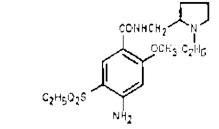PITTSBURGH -- The United States may be catching up to Europe in the number of available antipsychotic drugs, said Dr. Marc-Antoine Crocq of the Hospital Center in Rouffach, France,
Europe has long had more psychiatric drug options that the United States. But now new drugs are being introduced to the American and European markets almost simultaneously, and the same studies are being used to justify their approval on both sides of the Atlantic, he said at a meeting on schizophrenia sponsored by the University of Pittsburgh.
Two drugs that may soon cross the Atlantic if the companies seek marketing approval in the U.S. are penfluridol and amisulpride. Both are in use in Europe.
Penfluridol (Semap) is an oral antipsychotic with along half-life of 126-199 hours, which allows once-weekly administration. There is no good equivalent in the United States, Dr. Crocq said. It is manufactured by Janssen-Cilag in Issy-les-Moulineaux, France.
Amisuipride (Solian) is an injectable solution that is considered a precursor to atypical antipsychotics and causes few extrapyramidal side effects. It effectively treats negative symptoms at low dosages of 50-300 mg/day, while higher dosages of 400-800 mg/day inhibit positive symptoms. It is indicated specifically for bipolar disorder. Amisulpride is manufactured by Synthelabo in Amilly, France.
Historically most drugs have been in use in Europe for years or even decades by the time they receive marketing approval in the United States--clozapine being a notable example. By a recent estimate, there were more antipsychotics approved in France, a country with a population of only 60 million, than in the United States.
Most of these drugs are traditional antipsychotics, of equivalent efficacy to drugs that are approved in the United States, Dr. Crocq noted in an interview
The reason there are more approved drugs in Europe is that the approval procedure followed by the European Agency for the Evaluation of Medicinal Products is less strict than that of its US. counterpart, the Food and Drug Administration, Dr. Crocq said. The agency evaluates drugs by committee in a process that takes about 200 days and allows free circulation of the pharmaceuticals it approves throughout the European Union.
Drugs that fail or are expected to fail the committee approval process may opt to follow a decentralized procedure for approval by applying to each individual member state of the European Union. There is a certain degree of stigma associated with this approach, Dr. Crocq said.
A major difference in prescribing patterns in the European community is the use of very low dosages-by American standards. Psychiatrists prescribe low dosages in order to resolve the negative symptoms of psychosis, relying on psychotherapy to resolve the remainder of symptoms.
In France, all patients are insured through a compulsory national health service that deducts the cost of medical care from their salaries. Most hospitals and facilities are also government funded. The quality of care patients receive usually depends on the economic well-being of the country as a whole, although patients with financial means have the option of better care at a private hospital, he said at the meeting.
Drug reimbursement in France also follows a different protocol. At the beginning of each year, psychiatrists in France receive a quota that they are allowed to spend for antipsychotics. For this reason, patients may be more likely to receive a prescription for an expensive drug in January or February than in November or December. Of course, patients to whom money is no object can always get the drug they want, Dr. Crocq added wryly.
COPYRIGHT 2000 International Medical News Group
COPYRIGHT 2001 Gale Group



